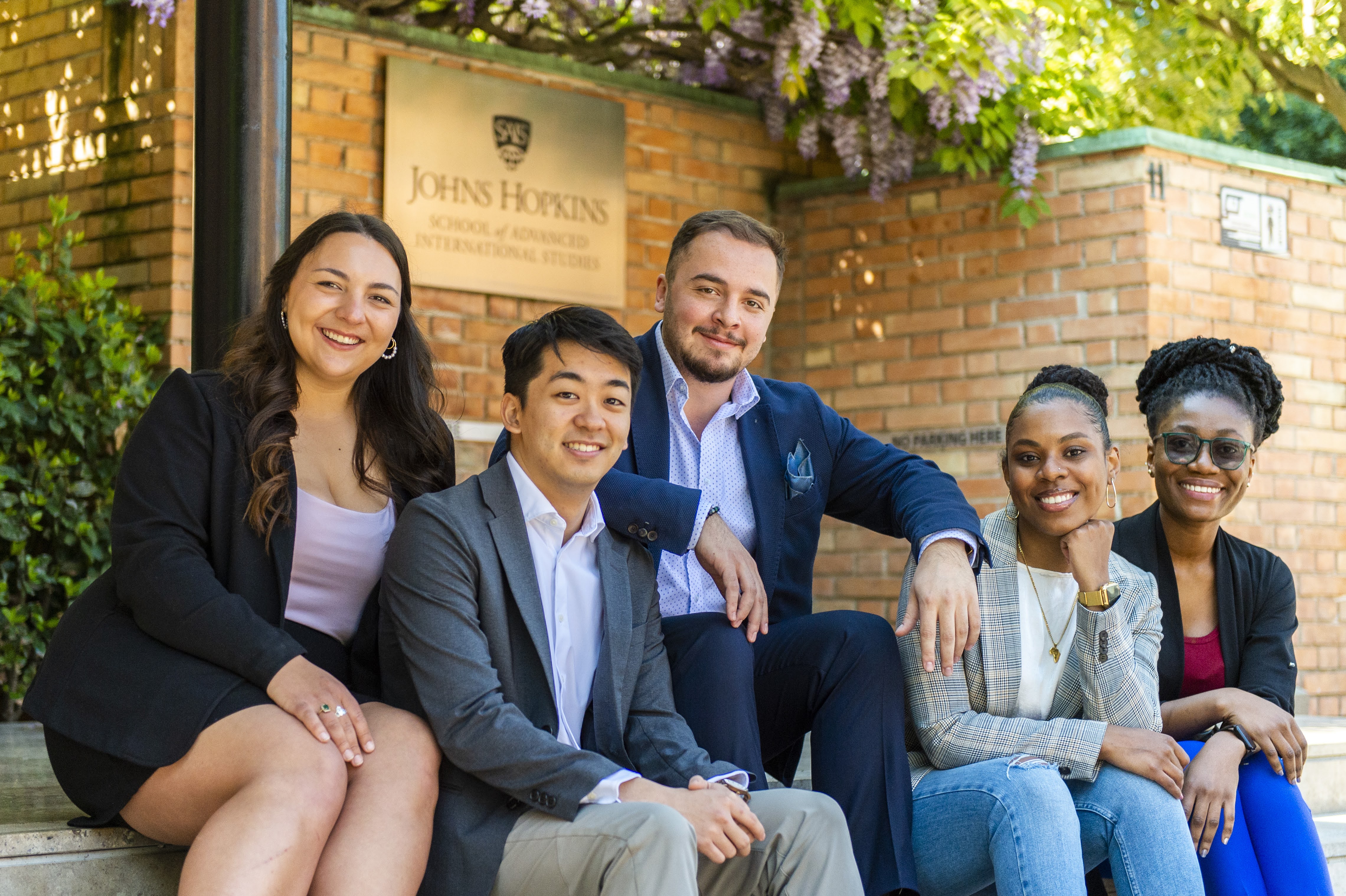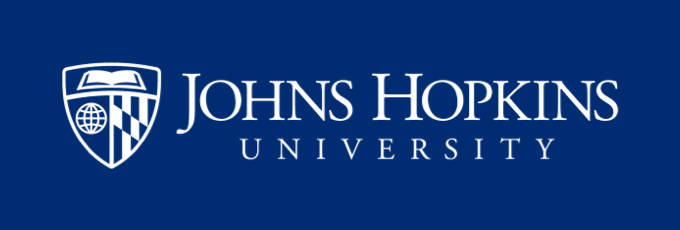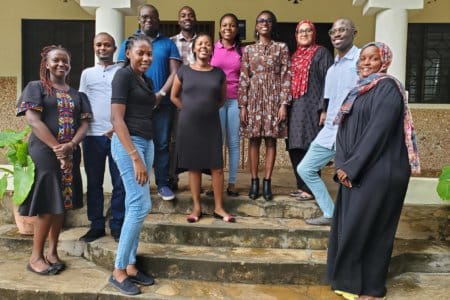After graduating with a BA in Political Science and Government, Ana Zhen Mui found herself at a crossroads: should she go to law school or follow her interest in International Relations?
Mui had worked as a legal assistant in California, interviewing children separated from their parents on their perilous trek to the United States. Hearing their traumatic experiences brought clarity to Mui.
“I decided to pursue my initial interest in International Relations instead because I wanted to explore how migration patterns can influence politics, economics, and cultural frameworks,” she says. “By applying to the Johns Hopkins University School of Advanced International Studies (SAIS) and the Hopkins-Nanjing Center (HNC), I wanted to understand how different issues and historical events (such as the Chinese diaspora in Latin America and the Caribbean) can shape diplomatic relations between states.”
Born in Colombia to Chinese parents, Mui grew up curious about her family’s history and origins. She would later find herself drawn to the growing diplomatic relations, investments and cultural exchange between Colombia and China over the past two decades. When she came across the HNC, Mui could envision a future connecting the two countries and the wider Latin American region.
“The main appeal of the HNC was the possibility of being in China, taking classes in Mandarin, and being part of a diverse community, with international students and students from China,” Mui says. “It is one of the best China programmes in International Relations.”

Source: JHU SAIS
SAIS was founded in 1943 to prepare the next generation of leaders to meet the complex challenges the U.S. and the world would face following World War II. For eight decades, the school has provided an interdisciplinary professional education that prepares its students for a fast-changing world.
In fact, in Foreign Policy magazine’s latest survey of scholars, policymakers, and think tank staff in July 2024, the most reputable survey in this field, SAIS’ master’s programmes climbed to the number two spot. The ranking asks international relations professionals to list the five best programmes in the world for students who want to pursue similar careers.
The two-year Master of Arts in International Relations programme emerged as a top choice thanks to a bold new curriculum that explores the intersection of economics, geopolitics, security, and the environment. You can spend both years in Washington, D.C., or split your studies between Washington and the European campus in Bologna, Italy, or the Hopkins-Nanjing Center in China.
Know the World to Change the World
Having the opportunity to study in multiple campuses is a unique advantage for SAIS students.
By taking part in research, scholarship, and applied practice in one location or more, you master deep cultural competence and gain practical experience. In practicum classes, you get to work in teams on real-time projects for external organisations, focusing on issues such as building green infrastructure in Indonesia or improving healthcare access in Kenya. As you sharpen your technical skills by conducting field research, you’ll hone soft skills such as leadership and teamwork, and consulting experience as well.
International study trips offer more nuanced explanations of how nations interact. SAIS students have travelled recently to Colombia, India, Japan, Kazakhstan, Peru, Korea, and Uzbekistan to work with local experts and communities.

Johns Hopkins SAIS students gain practical experience outside the classroom through study trips, practicums, staff rides, crisis simulations, career treks, and internships. Source: Johns Hopkins University
Just as immersive, and wholly more distinctive, is the staff ride. Students and faculty travel to the site of a particular historical conflict – such as Dunkirk, Dover, and London to examine the fall of France, the Dunkirk evacuation, and the bombing of Britain. During these visits to historic battle sites, students re-enact key moments, drawing lessons in leadership, strategy, and decision-making. These experiences are a unique opportunity to “think in time,” equipping SAIS students with the critical analytical skills to navigate the complex challenges they’ll face in their careers. Recent staff rides have been conducted in Berlin, Prague, Hawaii, and Baltimore.
But before that, many SAIS students would have had a chance to first explore their future career paths through another key feature of the school: internships.
Approximately 75% of MAIR students intern during the summer between their first and second years. Some even find part-time internships during the academic year. Employers that partner with SAIS include Centre for European Policy Studies, the World Bank, International Trade Centre, China Institute of International Studies, and more.
Beyond the classroom
With a network of close to 260,000 Johns Hopkins alumni, including 24,000 influential SAIS graduates and 70+ SAIS alumni chapters worldwide, the alumni community is vast and well-connected, offering current students mentorship and career support.
“SAIS alumni are very engaged regarding career advice, internships, and job recruitment,” says Ronnie Alinda Kyamureku, another SAIS graduate. “This connection to the job market keeps SAIS on top of emerging trends and ensures that courses reflect what’s happening in the world.”
These lasting professional and social networks were forged in SAIS. Cultural and social activities that help students bond and share their experiences are a big part of the school’s yearly calendar. You can serve on the Student Government Association, share your passions and talents in career-focused clubs, regional clubs, or activity-focused clubs, and so much more.
Ask any graduate, though, and they’ll probably say their best memories were made during SAIS’ signature events. This is when Washington, D.C. students come together for events like the annual Cherry Blossom Ball and the International Dinner, where they showcase their cultures through food, music, and dance. In Europe, the annual Thanksgiving Dinner lets American students share a piece of home with their classmates from abroad, while the Vienna Ball of Sciences is a much-anticipated highlight. In Nanjing, the annual Halloween Party, complete with creative costumes, is one of the most popular events.
“One of my favourite experiences at HNC was the welcome party in the spring semester,” Mui says. “I had just arrived in Nanjing, and it was the first time I had sat down and met my classmates, both Chinese and international. It made me feel part of the community.”
Learn more about Johns Hopkins University School of Advanced International Studies.
Follow Johns Hopkins University School of Advanced International Studies on Facebook, Twitter, YouTube, Instagram, and LinkedIn.













